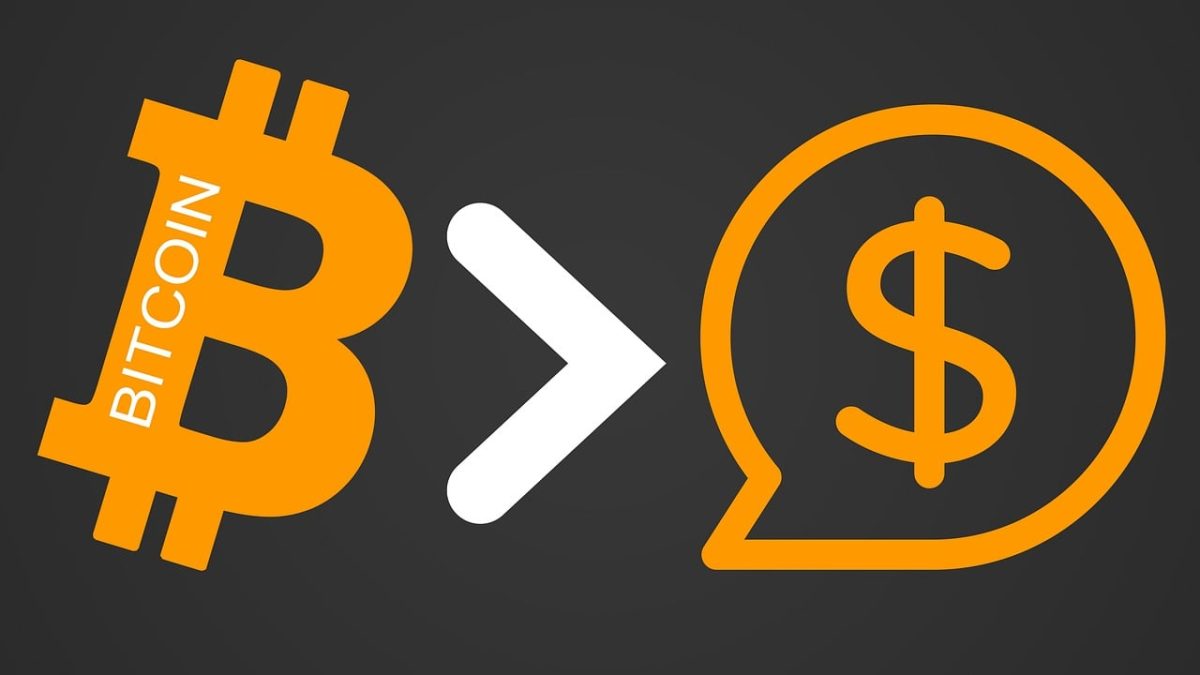Bitcoin had appeared in 2009 but didn’t generate much attention. It took a couple of years for the network created by Satoshi Nakamoto to gain significant value. In 2011, BTC reached $30, and two years later, it broke the $1,000 milestone.
Today, a single Bitcoin is worth around $59,000. The latest increase motivates investors to convert BTC to USD for profit, but what if Bitcoin has even more potential? With a market cap of over $1.12 trillion dollars, it’s the most popular cryptocurrency. Millions use it, and it threatens to become a more widespread global payment option than the US dollar.
In this article, we’ll discuss why Bitcoin has the potential to overthrow the USD and what could be potential obstacles. Keep reading to learn more about this crypto’s potential.
Reasons Why Bitcoin Might Gain Popularity Over the Dollar


It’s actually a crypto vs. fiat currency battle, although Bitcoin and US Dollar are leaders in their respective categories. Why would BTC become a user favorite compared to USD, and how could it make things better for individuals, companies, and other stakeholders?
Here are the top advantages offered by Bitcoin when compared to the US Dollar:
- Decentralization. Decentralized payments are the cryptocurrency foundation. The entire idea is that there’s no intermediary for your payment. You don’t need a bank or government institution to monitor and keep track. Instead, it all occurs via a decentralized system. That promotes privacy and anonymity, which many users see as a primary concern with fiat.
- Security. Bitcoin has multiple security layers on its blockchain. It uses cryptography and techniques like transaction hashing and block confirmation to ensure the network is impenetrable. In the history of BTC, hackers haven’t stolen a single token from the blockchain. That means your funds are secure as long as you pick a reliable wallet to store your assets and take the required precautions during transfers.
- Global acceptance. The first country to adopt Bitcoin as the official currency was El Salvador. Large companies like Microsoft and Tesla also accept BTC as a payment option. The idea of countries and “big players” in the industry offering Bitcoin has the goal of increasing the trustworthiness of digital currencies among users.
Another advantage of going digital is the wide range of Bitcoin use cases. Simplified cross-border transactions seem to top the list. Instead of worrying about potential legal obstacles and completing loads of forms, crypto transfers make things easier. As a bonus, having no payment processors also translates to faster transactions, which means there’s no waiting for hours or days for the funds to arrive. Finally, the transfers end up being more affordable than international fiat transactions.
Bitcoin could be more accessible in areas where traditional banking hasn’t developed enough. That makes it a viable payment option for underbanked and unbanked populations. Crowdfunding and merchant protection against chargebacks are among other popular use cases of BTC.
Factors Hindering Bitcoin’s Adoption as a Medium of Exchange
While BTC is attractive, some circumstances also make its adoption tricky. According to experts, these are the main problems the currency has been facing:
- Volatility. The entire crypto market has never reached particularly stable levels. Bitcoin has been from $67K to $15K and back to $59K in the last three years. Cryptocurrencies are famous for their volatility on a daily, weekly, and monthly basis, too. That makes BTC unreliable and causes trust issues among potential users.
- Transaction speed. The network’s throughput has specific restrictions, which causes transactions to be slower when the blockchain faces congestion. That also leads to high transfer fees, making transactions more expensive per trade. That’s why Bitcoin isn’t that suitable for frequent transfers and everyday trades.
- Government opposition. About 20 countries have banned cryptocurrencies on their territories in the last few years. Many other countries have unclear regulations regarding crypto payments. It will be important to enhance the legal framework around crypto payments as that could unlock the potential of furthering Bitcoin adoption.
Bitcoin developers do try to improve the network as much as possible. For example, there was a huge Taproot upgrade in 2021. It had the goal of collecting multiple transfers and signatures in a batch, which speeds up transaction verification.
Minor upgrades have been implemented since then, and there’s a long list of potential Bitcoin Improvement Proposals (BIPs). These are formal suggestions to improve the network, and their idea is to make Bitcoin faster, more secure, and more efficient.
How Does Bitcoin Adoption Influence Long-Term Investment Goals?
From the perspective of an investor, BTC could be an excellent trading opportunity in the long run. Cryptocurrencies have been there for over a decade, and they are here to stay. More markets, companies, and individuals are adopting BTC each day. With more businesses offering this payment method, Bitcoin’s popularity rises and value increases.
BTC has always been the driving force of the entire crypto market. Most experts agree the forecast is positive, and the token could soon break its all-time high reached in 2021. That means now is the right time to jump on board, especially for long-term investors. For the next five or seven years, BTC could gain huge value compared to USD. If you are in it for the long run, cryptos are currencies that seem worth the risk.
Conclusion
Bitcoin has been around for about 15 years, and it’s been exciting. It started modestly without attracting much attention, but today, this currency is a popular global payment option.
It’s questionable if it’s ready to replace USD, although many already prefer BTC over fiat currencies. Decentralization, security, and simple international transactions are the top reasons for that. However, network congestion and high fees make BTC unsuitable for everyday transactions at this point. Regulatory issues also hinder potential global adoption.
All this doesn’t mean that Bitcoin can’t co-exist as a great replacement for USD when you need simple cross-border transactions or prefer more privacy via a decentralized transfer. BTC is also attractive for investors since it’s the driving force of the entire crypto market, with positive forecasts for the coming years.






